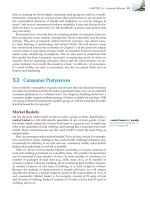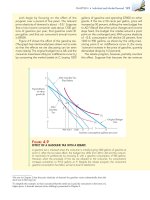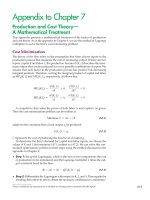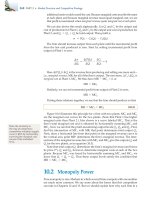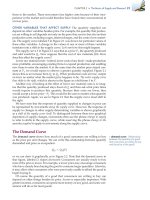(8th edition) (the pearson series in economics) robert pindyck, daniel rubinfeld microecon 132
Bạn đang xem bản rút gọn của tài liệu. Xem và tải ngay bản đầy đủ của tài liệu tại đây (99.33 KB, 1 trang )
CHAPTER 3 • Consumer Behavior 107
Mercedes-Benz automobiles over Volkswagens.
However, when they converted their savings into
deutsche marks, they flocked to Volkswagen dealerships. How can you explain this apparent paradox?
10. Draw a budget line and then draw an indifference
curve to illustrate the satisfaction-maximizing choice
associated with two products. Use your graph to
answer the following questions.
a. Suppose that one of the products is rationed.
Explain why the consumer is likely to be worse off.
b. Suppose that the price of one of the products is
fixed at a level below the current price. As a result,
the consumer is not able to purchase as much as she
would like. Can you tell if the consumer is better off
or worse off?
11. Describe the equal marginal principle. Explain why
this principle may not hold if increasing marginal utility is associated with the consumption of one or both
goods.
12. The price of computers has fallen substantially over
the past two decades. Use this drop in price to explain
why the Consumer Price Index is likely to overstate
substantially the cost-of-living index for individuals
who use computers intensively.
13. Explain why the Paasche index will generally understate the ideal cost-of-living index.
EXERCISES
1. In this chapter, consumer preferences for various commodities did not change during the analysis. In some
situations, however, preferences do change as consumption occurs. Discuss why and how preferences
might change over time with consumption of these
two commodities:
a. cigarettes.
b. dinner for the first time at a restaurant with a
special cuisine.
2. Draw indifference curves that represent the following individuals’ preferences for hamburgers and soft
drinks. Indicate the direction in which the individuals’
satisfaction (or utility) is increasing.
a. Joe has convex indifference curves and dislikes
both hamburgers and soft drinks.
b. Jane loves hamburgers and dislikes soft drinks. If
she is served a soft drink, she will pour it down the
drain rather than drink it.
c. Bob loves hamburgers and dislikes soft drinks. If he
is served a soft drink, he will drink it to be polite.
d. Molly loves hamburgers and soft drinks, but insists
on consuming exactly one soft drink for every two
hamburgers that she eats.
e. Bill likes hamburgers, but neither likes nor dislikes
soft drinks.
f. Mary always gets twice as much satisfaction from an
extra hamburger as she does from an extra soft drink.
3. If Jane is currently willing to trade 4 movie tickets for
1 basketball ticket, then she must like basketball better
than movies. True or false? Explain.
4. Janelle and Brian each plan to spend $20,000 on the
styling and gas mileage features of a new car. They
can each choose all styling, all gas mileage, or some
combination of the two. Janelle does not care at all
about styling and wants the best gas mileage possible. Brian likes both equally and wants to spend an
equal amount on each. Using indifference curves and
budget lines, illustrate the choice that each person will
make.
5. Suppose that Bridget and Erin spend their incomes on
two goods, food (F) and clothing (C). Bridget’s preferences are represented by the utility function U(F,C) ϭ
10FC, while Erin’s preferences are represented by the
utility function U(F,C) ϭ .20F2C2.
a. With food on the horizontal axis and clothing
on the vertical axis, identify on a graph the set of
points that give Bridget the same level of utility as
the bundle (10, 5). Do the same for Erin on a separate graph.
b. On the same two graphs, identify the set of bundles
that give Bridget and Erin the same level of utility
as the bundle (15, 8).
c. Do you think Bridget and Erin have the same preferences or different preferences? Explain.
6. Suppose that Jones and Smith have each decided to
allocate $1000 per year to an entertainment budget
in the form of hockey games or rock concerts. They
both like hockey games and rock concerts and will
choose to consume positive quantities of both goods.
However, they differ substantially in their preferences
for these two forms of entertainment. Jones prefers
hockey games to rock concerts, while Smith prefers
rock concerts to hockey games.
a. Draw a set of indifference curves for Jones and a
second set for Smith.
b. Using the concept of marginal rate of substitution,
explain why the two sets of curves are different
from each other.
7. The price of DVDs (D) is $20 and the price of CDs (C)
is $10. Philip has a budget of $100 to spend on the two
goods. Suppose that he has already bought one DVD
and one CD. In addition, there are 3 more DVDs and 5
more CDs that he would really like to buy.
a. Given the above prices and income, draw his
budget line on a graph with CDs on the horizontal
axis.
b. Considering what he has already purchased and
what he still wants to purchase, identify the three

